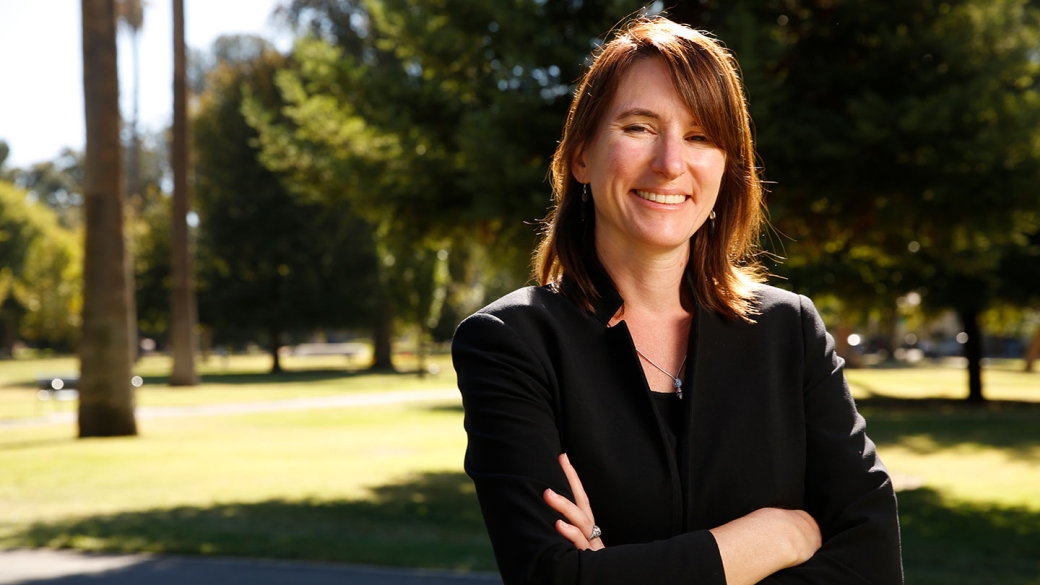Into the Wild
| by Eva Gudbergsdottir

Valerie Termini MAIEP ’06 made waves earlier this year when she became the first female executive director of the California Fish and Game Commission. She shares with us some of the major stepping stones along her way.
Roaming: Growing up in rural Massachusetts, I spent most of my days roaming around the woods with my dog. We would frequently be outside, hiking, exploring, and fishing. It instilled in me a deep appreciation for and love of nature.
Volunteering: As a Peace Corps volunteer in Togo, my focus was on environmental conservation. I lived in a rural area and appreciated not living connected to things: clocks, electricity—it was simpler in some senses. One of my favorite things there was being able to teach young kids about the wonders of the ocean. Many of the students had never heard of the ocean or thought about marine life, and they were fascinated. Living in Togo also made me realize that all people want a healthy environment and care about protecting the delicate balance of an ecosystem.
Seeking: When thinking about which graduate school to attend, I Googled “international ocean policy management” or something along those lines, and the first thing to pop up was MIIS. It seemed perfect for me—the Peace Corps connection, the international focus, the location. It was a great opportunity.
Keeping an open mind: At the Institute there is very much a great spirit of finding ways to work with everyone, to keep an open mind and to try and understand where other people are coming from. There are a lot of controversial decisions that come before the commission, and it is our job to listen to all sides and find the middle ground. At the end of the day, whether the commission is increasing limits for fishing and hunting or recommending that a species be put on the California endangered species list, we are all people who deeply care about the environment and our role in it. We all have a stake in preserving nature.
I am oddly hopeful that we all can make a difference. The people who are working on these issues are all in, and they are working hard to come up with creative solutions and thoughtful policy measures. A healthy, thriving planet is worth fighting for and we have to enact positive change that will leave the environment more resilient for the future.
Protecting the ocean: At the California Ocean Protection Council, my focus was on working with commercial fishermen and developing marine policy. Our state has some of the most progressive fishery laws in the world. I believe it is important to connect consumers back to the ocean, and to the fishermen, and to provide them with the tools to ensure that we can all enjoy California seafood well into the future.
Basing policy on science: The commission sets regulations enforced by the California Department of Fish and Wildlife. The population of California is getting close to 40 million, and there are a lot of competing resources and interests to consider. The drought has compounded these issues. For example, there are now many more interactions between people and wildlife, such as the five thousand or so coyotes in Los Angeles. Public opinion on how to deal with this varies wildly, from creating wildlife sanctuaries to killing the packs. We have to ask ourselves what the best way is to manage an entire species and how to do that practically in a major metropolitan city, such as Los Angeles. It is important to find solutions that balance the needs of people, economic considerations, and the environment, and base those solutions on sound science.
Being oddly hopeful: I am very concerned about the impact of climate change on all species, including people. The greatest challenges are how we are going to conserve healthy, intact ecological systems with a warming planet. Fishery stocks are moving north, animals are changing their migratory routes, cities are experiencing 100-year floods every five years. We have to address these issues head on and not bury our heads in the sand. Yet I am oddly hopeful that we all can make a difference. The people who are working on these issues are all in, and they are working hard to come up with creative solutions and thoughtful policy measures. A healthy, thriving planet is worth fighting for and we have to enact positive change that will leave the environment more resilient for the future.
For More Information
Eva Gudbergsdottir
evag@middlebury.edu
831-647-6606
Jason Warburg
jwarburg@middlebury.edu
831-647-3516
